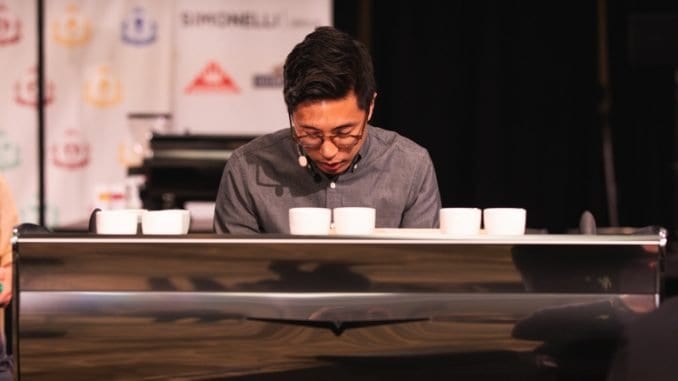
David Castillo fought through three rounds of competition to place fourth at this year’s United States Barista Championship. In this interview he reflects on preparation, learning from mistakes, and much more.
BY ASHLEY RODRIGUEZ
BARISTA MAGAZINE ONLINE
Photos courtesy of Jake Olson
Often, the top finishers at the United States Barista Championship are people you may expect—the folks who finish at the top of their regional, for example, or those who have placed in the top six in years past. David Castillo of Joe Coffee in New York placed fourth at the 2018 USBC after finishing shy of the top six at the qualifying event in Reno, meaning he had to compete in every single round of competition—which is rare, exciting, and exhausting. In this interview, David talks about why finishing out of the top six in Reno actually helped him, what he hoped to achieve in his routine, and the best advice he’s ever received.
Ashley Rodriguez: Can you tell us about your coffee background? How did you get to where you are right now?
David Castillo: I’ve worked in coffee for six years now, all with Joe. I originally got into coffee because it offered the opportunity for a flexible day job, but I quickly realized that it was something that I wanted to pursue professionally. Since then, I have worked as a barista, manager, and trainer. I currently manage our training and education department, which includes overseeing our barista training, in-store QC, and public education programs.
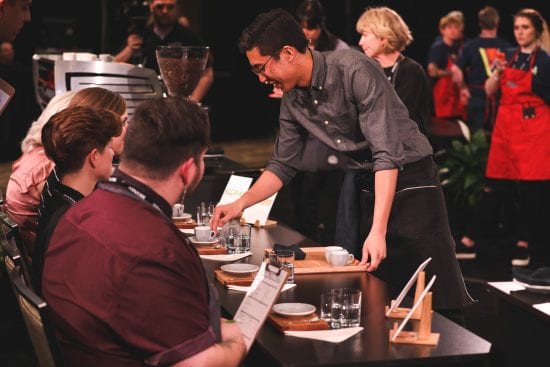
Working in training and education helped immensely in competition. It gives you the opportunity to take a step back and understand how other people experience coffee, whether it’s learning technique, understanding extraction, or developing their palates. I feel like a big part of competition is having a willingness to unlearn old habits and rethink everything from the ground up, and seeing others build a solid foundation gave me a fresh perspective.
AR: Can you tell us about the coffee you used? A lot of your routine was focused on making Geisha coffees accessible, and I wonder how that translates in your role at Joe.
DC: I used a Colombian Geisha from Manantiales del Frontino, which we’ve been buying and serving at Joe since 2016. I fell in love with this coffee the first time I tried it, and always had an idea that it would make a great competition coffee. When we cupped it next to other samples, it consistently stood out, and our head roaster, Andrew Oberholzer, was able to take it to a whole different level.
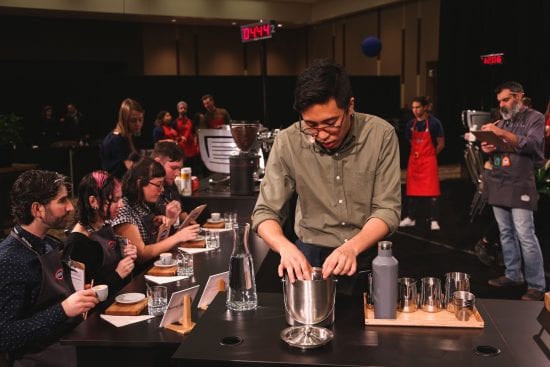
One of the things we realized right away was how much customers loved this coffee, which is not something that always happens with Geishas. I think that a big reason for this is that this coffee is so sweet—it’s exceptionally sweet for both a Geisha and a washed coffee—and it’s balanced while still having all of those classic Geisha notes. An important part of training is preparing baristas to set proper expectations for customers, and that can be challenging when we’re serving a type of coffee that a lot of people have maybe never tasted. So, the fact that this coffee has been a favorite among both staff and customers made for a great jumping-off point in putting together the routine.
AR: You were the only competitor that had to do their routine three times. What did that feel like? Do you think your routine got better as you went along?
DC: I definitely did not get much sleep that weekend! It’s funny, the first round went well and so I thought that the second round would feel even better, but my semifinals routine felt less smooth. Maybe it was coming down from an emotional high or an adrenaline crash or something? I had always imagined that making the finals would be really nerve-wracking, but at that point I had done two performances and three practice sessions, and that definitely helped me feel more relaxed. I also was lucky to do all three rounds on the same station and machine, so I was starting to feel pretty comfortable in that space—at least as comfortable as you can get! Just making the finals was a better turnout than I could have imagined, so the last routine was the least pressure I had felt all weekend. I don’t know if the finals routine was necessarily the best of the three, but for me, it was definitely the most fun.
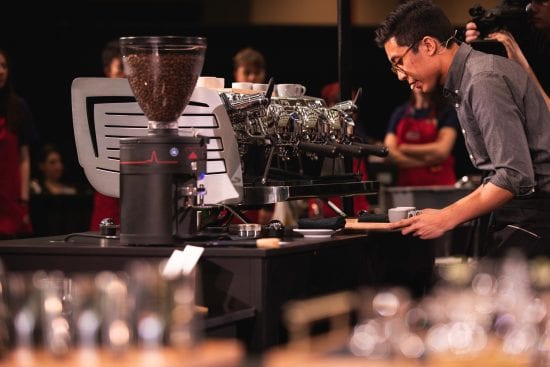
AR: Did you change anything between your routine at Reno and your USBC routine? You made a huge jump from your performance at Reno versus USBC—can you talk a little bit about that?
DC: I actually think that not making the top six in Reno was a good thing, since I knew that I needed to do a ton of work before Seattle. The most useful piece of feedback from one of my judges in Reno was that I didn’t have a coherent enough theme, so I basically reworked the entire routine and made sure it had a focal point that was clear, simple, and consistent throughout all three courses. By making sure that everything tied back to the theme, the whole routine became more structured and organized.
AR: You’ve competed in the past—how was it different this time around? Since you’ve competed in the past, how have you seen yourself grow and change?
DC: I will reiterate what so many people have already said: It’s so important to receive feedback! No matter how many times I read the rules, I didn’t learn how they really worked until getting my first scoresheets and going over them with my judges. I am also fortunate enough to have a coach, Brian Gelletly, and a support team at Joe that are not only supremely talented and have amazing palates, but are also willing to give me honest feedback. Preparing for competition and improving from one year to the next really meant learning how to receive constructive criticism without taking it personally, whether it was from judges, friends, or coworkers. It’s hard to put a lot of work into an idea only to hear that it’s terrible, but the benefit of being able to both receive and offer feedback is something that I’ve taken from competition and adapted in other facets of my job.
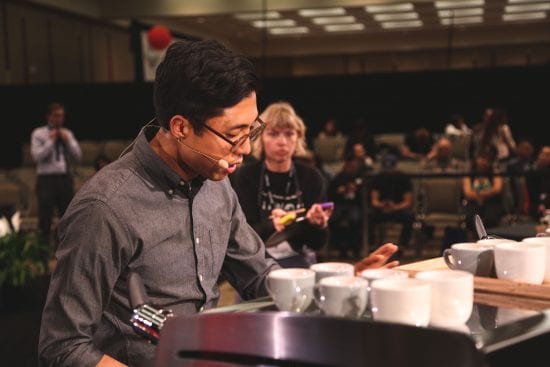
AR: What would you like to see competition be better at?
DC: Inclusivity. I will be the first to acknowledge that, as a man who works at a company with sufficient resources to buy a high-scoring coffee, a dedicated training space to practice, and the ability to cover the finances of competition, I have a pretty significant advantage over a lot of people who would like to participate. I think that progress is slowly being made and we are starting to see a more diverse pool of competitors, but I also think the structure of competition could allow for even broader participation.
AR: What would you want to share with others thinking about competing? What have you learned along the way that you think is unique to your experiences?
DC: I think anybody who is thinking about competing should know that it’s a big-time commitment, and it requires a ton of mental energy and self-motivation. You will be very stressed out and over-caffeinated, and you’ll go to bed and wake up thinking about your routine. But, you will also work with your coach/coaches in a very honest, creative, and collaborative way that I think is pretty unique in the coffee industry. So basically, it’s super fun and you should totally do it! My biggest takeaway professionally is learning how to become a better trainer and educator through competing. The tech scores have given me an eye for detail, and the sensory scores have helped me in coaching new baristas in palate development and thinking about tasting coffee in an objective way.
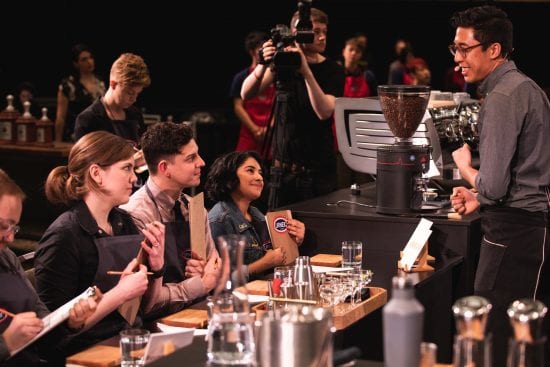
AR: Will you compete again?
DC: On top of the personal challenge, I really love how competition has fostered a sense of excitement among the staff at Joe, especially with a lot of newer baristas, and has shown that there are amazing opportunities within this industry and community that they might not have known about. For now, I’m saying I won’t put myself through it again, but ask me again in a few months!

